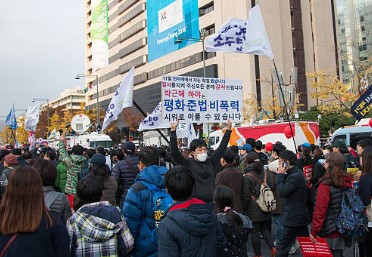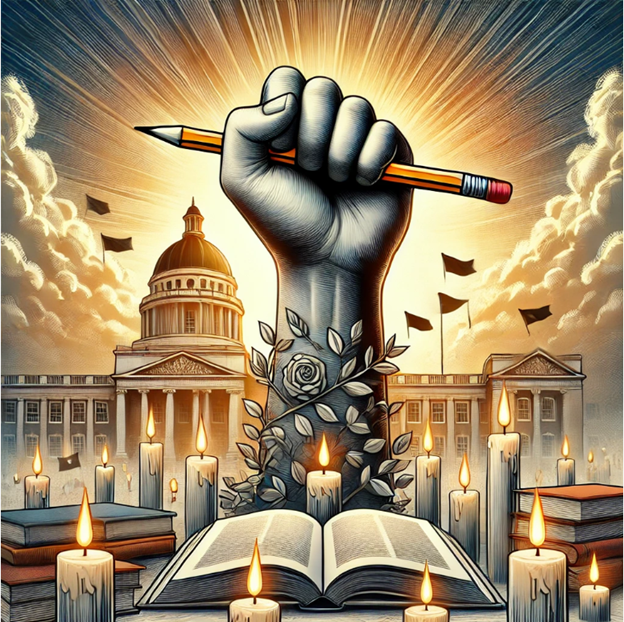Campus Battlegrounds: How the Universities of Georgia and South Korea Became Frontlines in the Fight for Democracy
Input
Modified
Georgia’s “Education Reform”: A Veil for Authoritarian Control South Korea’s Impeachment Uprising and the Return of Student Activism Why Authoritarianism Targets Campuses First

Georgia’s “Education Reform”: A Veil for Authoritarian Control
It is frequently asserted that universities are the beating arteries of a nation's future, serving as incubators of thought, identity, and progress. But in 2024 and 2025, in two countries that were separated by an ocean, those hearts began to pulse not only with learning but also with defiance. Universities have evolved into the new frontlines in national struggles over democracy itself, as evidenced by the transformation of lecture halls, dormitories, and student plazas in Georgia and South Korea.
Student-led protests regarding political crises in both nations have evolved into full-scale resistance movements. These are battles over the soul of two nations, far beyond curriculum debates or student governance. These battles are currently being fought by young people who, in many instances, were not even born during previous waves of authoritarianism. They have not only inherited campuses, but also a legacy of resistance. Additionally, they are continuing to advance it.
In May 2024, Prime Minister Irakli Kobakhidze of Georgia issued a dramatic statement: the country's entire higher education system required "complete transformation." He proposed the consolidation of all universities into two state-controlled centers—one in the capital, Tbilisi, and the other in Kutaisi—under the banner of "reform." The Georgian government asserted that it would enhance academic standards and eliminate political bias from universities.
However, it was anything but reform to a significant number of individuals within the country.
To the students and faculty of Tbilisi State University (TSU), the most prestigious and oldest institution in the country, it was evident that the government's true objective was political control. The adjustments were overseen by a commission that was not composed of educators, but rather of ministers and high-ranking officials, such as the Minister of Justice and the Mayor of Tbilisi. The commission was devoid of any academic members.
This was not merely a matter of bureaucratic restructuring. It was a purge.
Critics contend that the Georgian Dream (GD) party has been methodically extending its influence over Georgian institutions for years, including courts, media, law enforcement, and, most recently, universities. Since assuming power in 2012, the party has strengthened its control by utilizing political appointments and patronage networks. The subsequent target was TSU, which served as a representation of civic and intellectual activity.
Academics and students who were willing to resist were penalized. Zviad Tsetskhladze, a TSU law student and the leader of the youth movement Dafioni ("Dusk"), was detained and charged with inciting group violence in early 2025. This offense is punishable by a maximum of nine years in prison. In reality, his offense was protesting on campus.
In spring 2024, Niko Managadze, another student, became a national symbol of resistance after he confronted Prime Minister Kobakhidze during a campus appearance. A government-aligned throng assaulted him shortly thereafter, and he was the subject of a vicious smear campaign on state-controlled media. The media even broadcast footage of his mother condemning him on national television.
The government responded with a heavy hand as protests grew across institutions in Tbilisi and Batumi. Campuses were searched by security personnel. Students were subjected to physical abuse. Faculty members were terminated. In a chilling scenario, leaked video footage depicted TSU administrators opening campus gates to police and security agents in order to dismantle peaceful student sit-ins. The university had been transformed into a staging ground for repression, despite its initial vision as a sanctuary of thought and debate.
Additionally, the institution maintained its reticence. There was minimal opposition from university administrations. Some students actively supported the state's efforts to expel or penalize protesting students. The university's traditional function as a buffer between the state and society was being dismantled, with its autonomy being sacrificed on the altar of political expediency.
Nevertheless, Georgia's pupils have not yielded in the face of intimidation. A new generation of civic actors is emerging, ranging from underground publications and alternative learning spaces to graffiti campaigns and flash demonstrations. They are not merely advocating for academic freedom; they are also striving to reclaim the democratic future of their nation.

South Korea’s Impeachment Uprising and the Return of Student Activism
Another political storm erupted in December 2024 in South Korea, thousands of kilometers away, when President Yoon Suk-yeol abruptly declared martial law in response to increasing political pressure. The decree was only in effect for three hours, but it was enough to shatter public trust and set off a series of events that would deeply shake the democratic institutions of the nation.
The South Korean National Assembly resolved to impeach Yoon on 14 December, resulting in his suspension from office. His fate will be determined by a Constitutional Court ruling, which is anticipated to be issued in March 2025. However, South Korea's university campuses were already bustling with chanting and banners as politicians engaged in courtroom discussions regarding constitutional articles.
Sit-ins, teach-ins, and mass rallies were organized by students at Seoul National University (SNU), Yonsei, Korea University, and Ewha Womans University. Their message was unequivocal: Yoon's actions were an attack on democracy, and silence was not an option.
However, these movements were promptly greeted with hostility, not only from state authorities but also from political outsiders, as was the case in Georgia. Campuses were infiltrated by far-right groups and ultra-nationalist YouTubers, some of whom had hundreds of thousands of followers. These individuals were not alumni or concerned citizens. A significant number of these individuals were middle-aged outsiders who violated university entry restrictions, filmed students without their consent, and disrupted nonviolent demonstrations.
The situation at Ewha Womans University became violent on 26 February when anti-impeachment demonstrators invaded the campus, slapping students, tearing down signs, and shouting misogynistic slurs. For defending her colleagues, one student was spat upon. Another individual was subjected to verbal abuse that was disguised as gendered humiliation, including the phrases "Lose some weight" and "Do you love me?"
Ewha's students maintained their composure in the face of the vitriol. In the event of an emergency, they conducted press conferences. Each assault was individually recorded. They addressed the media, displayed placards, and expressed their determination to remain unwavering. A student assembly vote at Yonsei revealed an astonishing level of support for impeachment: 2,704 in favor, with only 8 people opposed.
Even so, apprehensions intensified. The presence of external actors was eroding the overwhelming student support for impeachment, thereby falsely inflating the perception of division. Through the extensive online student forum Everytime, a recently established organization known as "Liberty University", which was spearheaded by a student at Hanyang University, orchestrated pro-Yoon initiatives. However, their events frequently featured only a small number of students, who were surrounded by dozens of non-students.
In response, administrators at the university initiated the implementation of new policies. SNU has announced that it will require advance sanction for all demonstrations, which will include the documentation of expected attendees, objectives, and the use of loudspeakers. In a nation with a long history of democratic activism lead by students, this action represented a substantial and contentious change.
Nevertheless, the scholars persevered. Yoon was not the sole focus of their argument. The issue at hand was the preservation of democratic accountability in a nation that is still in the process of recovering from its previous authoritarian regime. They recalled that student protests were instrumental in the overthrow of military regimes during the 1980s. The campus walls were now reverberating with that same spirit.

Why Authoritarianism Targets Campuses First
The challenges that are currently being experienced in Georgia and South Korea are distinct in their specificities, but they are united in their broader significance. The erosion of democratic norms and the increasing authoritarian temptation to neutralize dissent through the co-opting—or suppression—of academic institutions are both indicative of an alarming global pattern.
Universities are frequently the initial targets. Why is this?
For the reason that they serve as incubators for critical thinking. Because they foster the development of independent thought. Because they establish communities in which students acquire the ability to question, rather than merely considering what to believe. This poses a threat to any regime that aspires to complete control.
The educational "reform" implemented by the government in Georgia is a strategic conquest. The repression in South Korea is more reactive, but it is equally perilous. In both cases, students are subjected to harassment, vilification, and occasionally physical violence as a result of their involvement in civic affairs.
However, they are also resisting in both instances, demonstrating unwavering confidence in their role as advocates for democracy, as well as creativity and courage.
What is at risk is not merely academic freedom. Public institutions are responsible for safeguarding civic territory. It is the capacity of citizens, particularly young people, to engage in the process of forming their governments by questioning, criticizing, and contributing.
The final holdouts of free thought in increasingly authoritarian environments may also be at risk if universities collapse.
This conflict is not limited to Georgia and South Korea. The conflict over university control is becoming increasingly intense, spanning from Hungary to Turkey, Brazil to Myanmar, and even within long-standing Western democracies.
The students who are protesting on the sidewalks of Tbilisi and Seoul are not merely advocating for faculty representation or campus policies. They are advocating for a society in which knowledge is not a tool of state authority, but rather a weapon against it. In the context of education, citizenship is fostered rather than conformity.
Their courage necessitates recognition. Their fortitude warrants our support. And their cause—the defense of democracy—should serve as a reminder to us all that the frontlines of freedom frequently traverse our campuses.
We should not turn our gaze away.





















